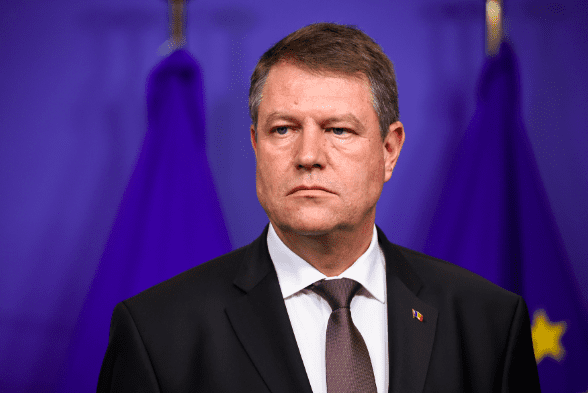
שרות מנהיגי ארגונים יהודים באירופה קוראים לבית מכירות פומביות בארה”ב – לבטל מכירה הצפויה להיערך מחר (שישי), שבמסגרתה יוצעו למכירה מגוון רחב של פריטים שהיו בבעלותו של אדולף היטלר, זוגתו אווה בראון, ובכירים במפלגה הנאצית ובצבא.
למעלה מ-30 מנהיגי קהילות וארגונים יהודים אירופאים הצטרפו לקריאתו של יו”ר איגוד הארגונים היהודים באירופה (EJA), הרב מנחם מרגולין, לבטל מכירה פומבית שמתוכננת להתקיים מחר בבית המכירות אלכסנדר במדינת מרילנד בארה”ב, שבה יימכרו שלל פריטים נאציים. בין הפריטים המוצעים למכירה ניתן למצוא את שעון הזהב של היטלר, קולר השייך לכלב של אווה בראון, נייר טואלט וורמאכט וסכו”ם וכוסות שמפניה של בכירים נאצים.


Israel has a new President, Mr Isaac Herzog. The Herzog’s have a fine tradition of important positions in Israel: his grandfather was a Chief Rabbi of Israel, and his father, Chaim, a former President of Israel too.
We wish the 11th President of Israel lots of Mazal, lots of strength and lots of courage. Qualities that we know from our many contacts with Mr Herzog, are not in short supply where he is concerned.

The Chairman of the European Jewish Association Rabbi Menachem Margolin expressed his concern at remarks made by the Romanian President in which he resorted to language such as “secret agreements with the Jews.”
President Klaus Iohannis made the remarks to the media following Romanian Prime Ministerial meetings with the Israeli government. The President it seems was expressing his discomfort over not being previously consulted on the content of the visit as well as on the decision of Jerusalem recognition, according to established protocol, where the controversial remark was made.
Rabbi Menachem Margolin, whose Brussels based organisation represents Jews across the continent warned that Heads of State should avoid using such language “heavy at it is with connotation and sinister undertone.”
In a statement from Brussels, Rabbi Margolin said,
“Regardless of established protocols and the President’s evident displeasure that they were not adhered to, I would urge restraint and caution when it comes Heads of State to using language such as this.
“In the media heat of the moment, finding the correct words is not always easy, and we are prepared to give the President the benefit of the doubt on this occasion. But using such language, loaded as it is with connotation and sinister undertone, can be seized upon by unsavoury elements in society and naturally, sets off alarm bells amongst the Jewish community.”
„Trebuie să luptăm pentru o lume mai bună, împotriva antisemitismului, împotriva urii de orice fel împotriva oricui, minoritate sau religie, putem să o facem, voi puteţi să o faceţi, şi copiii, şi nepoţii voştri”, a declarat Gideon Lev, în vârstă de 87 de ani, un supravieţuitor al ghetoului din Terezin, cu prilejul unei conferinţe organizate de European Jewish Association (EJA), la Praga şi Terezin, înainte de comemorarea, vineri, a Zilei Internaţionale de Comemorare a Victimelor Holocaustului, transmite agerpres.
Rabinul Menachem Margolin, preşedintele EJA, a declarat, în cadrul unei întâlniri cu jurnaliştii, că „fiecare loc are un mesaj diferit”, iar „principalul mesaj al Terezin pentru noi este ‘fake news’, faptul că naziştii încercau să pretindă că i-au tratat pe evrei într-un mod foarte bun”.
„Aceste ştiri false i-au ajutat să fie elogiaţi de mulţi oameni, în loc să fie atacaţi şi arestaţi şi Terezin eliberat. Întrucât astăzi ne confruntăm cu multe ‘fake news’, care sunt unul dintre lucrurile ce le permite antisemiţilor să incite, este important pentru noi să abordăm acest lucru în special”, a adăugat Menachem Margolin.
Peste 100 de parlamentari, oficiali guvernamentali, ambasadori şi lideri ai comunităţilor evreieşti europene au făcut, la începutul acestei săptămâni, front comun împotriva ştirilor false antisemite şi s-au angajat să promoveze iniţiative educaţionale împotriva urii în cadrul conferinţei EJA de la Praga şi a unei vizite la ghetoul de la Theresienstadt.
Citeşte şi: Boris Johnson a primit 510.000 de lire ca avans la memorii, în timp ce avocaţii săi costă bugetul 220.000
Ghetoul de la Theresienstadt a fost prezentat de nazişti ca fiind o „aşezare evreiască” şi un „ghetou luminat”, dar faptele istorice dovedesc că acestea au fost „fake news”, deşi filmele de propagandă naziste şi pregătirile făcute la faţa locului în scopul de a ascunde cruda realitate au reuşit să păcălească inclusiv o delegaţie a Crucii Roşii venită în vizită la faţa locului în timpul războiului. Circa 120.000 din cei 160.000 de evrei care au fost trimişi aici au murit în timpul Holocaustului, între care 14.000 de copii. Unii dintre ei au fost trimişi în camerele de gazare de la Auschwitz, în timp ce mulţi au murit de foame şi de boli. Circa 40.000 de oameni au murit în ghetoul de la Terezin.
„Fake news”, teoria conspiraţiei şi rolul reţelelor sociale
Directorul organizaţiei britanice „Labour Against Antisemitism”, Alex Hearn, a vorbit în cadrul conferinţei EJA despre cum ştirile false despre evrei reprezintă un tipar la fel de vechi ca antisemitismul însuşi. Hearn a subliniat că antisemitismul merge dincolo de orientările politice şi este folosit de oameni pentru a câştiga putere sau pentru a se simţi puternici. El a vorbit, de asemenea, despre teoriile contemporane ale conspiraţiei antisemite şi despre rolul social media în diseminarea lor.
„Sunt atât de multe lucruri de care evreii sunt acuzaţi, inclusiv de faptul că nu joacă un rol în acest război oribil între Rusia şi Ucraina”, a spus la rândul său Menachem Margolin.
În cadrul conferinţei, o serie de parlamentari şi lideri ai comunităţilor evreieşti au vorbit despre influenţa reţelelor sociale în calitate de catalizator al adoptării teoriilor antisemite care reprezintă o ameninţare directă pentru siguranţa personală a evreilor europeni.
„Adevărul nu mai este bazat pe fapte ştiinţifice, ci pe ştiri virale şi social media. Lucrurile se întâmplă mai repede. Trebuie să luptăm împotriva unor ştiri false care ne apar repede pe telefon. Macron însuşi a fost prezentat ca o marionetă a evreilor pentru că este fost bancher şi are bani. Ştirile false folosesc aceleaşi stereotipuri împotriva evreilor, din nou şi din nou. Trebuie să luptăm împotriva oricărei ştiri false. Dacă nu le combatem, se răspândesc, şi se răspândesc foarte repede”, a declarat parlamentarul francez Prisca Thevenot, purtătoare de cuvânt a partidului Renaissance, al preşedintelui Emmanuel Macron.
„Trebuie să înţelegem că social media lucrează extrem de repede. Nu este suficient să faci legi să ţii pasul cu provocările tehnologice, trebuie să fim rapizi în a interzice discursurile care incită la ură de pe social media”, a afirmat la rândul său parlamentarul austriac David Stogmuller.
În ceea ce-l priveşte, parlamentarul portughez Alexandre Poco a subliniat importanţa educaţiei în combaterea antisemitismului. „Deşi problemele noastre ar putea să nu fie atât de mari ca ale altor ţări, trebuie să continuăm să investim în educaţie. O atitudine proactivă continuă să fie necesară. Avem legături puternice cu comunităţile evreieşti. Continuăm să promovăm viaţa evreiască, deşi suntem o ţară catolică”, a spus el în cadrul conferinţei.
„Dacă le permitem duşmanilor democraţiei să strige, atunci riscăm sfârşitul democraţiei. Antisemiţii trebuie făcuţi să simtă că nu au nicio şansă şi că vor fi făcuţi să plătească consecinţele”, a avertizat la rândul său comisarul pentru antisemitism pentru comunitatea evreiască din Berlin, Sigmount Königsberg.
La rândul său, Joel Mergui, preşedintele Consistoriului din Paris, care conduce de „20 de ani cea mai mare comunitate evreiască din Europa”, a spus că a decis să încurajeze membrii acestei comunităţi să continue să trăiască pe Bătrânul Continent atâta timp cât îi vor avea alături de ei pe decidenţi în lupta împotriva antisemitismului şi a islamismului radical. „Din cuvintele şi din acţiunile dumneavoastră vom avea certitudinea că avem un viitor în Europa”, le-a transmis el oficialităţilor prezente la conferinţă.
Citește și: Mark Rutte vrea înăsprirea regulilor privind migraţia – Black News
https://blacknews.ro/supravietuitor-al-ghetoului-din-terezin-trebuie-sa-luptam-pentru-o-lume-mai-buna-impotriva-urii-de-orice-fel/
It’s a challenging time for Jewish communities in Europe. Anti-Semitism is on the rise as populism and the politics of the lowest common denominator are gaining traction. Our communities often need round the clock protection and our practices and customs such as keeping Kosher are under pressure from increasing political interference.
| Cookie | Duration | Description |
|---|---|---|
| cookielawinfo-checkbox-analytics | 11 months | This cookie is set by GDPR Cookie Consent plugin. The cookie is used to store the user consent for the cookies in the category "Analytics". |
| cookielawinfo-checkbox-functional | 11 months | The cookie is set by GDPR cookie consent to record the user consent for the cookies in the category "Functional". |
| cookielawinfo-checkbox-necessary | 11 months | This cookie is set by GDPR Cookie Consent plugin. The cookies is used to store the user consent for the cookies in the category "Necessary". |
| cookielawinfo-checkbox-others | 11 months | This cookie is set by GDPR Cookie Consent plugin. The cookie is used to store the user consent for the cookies in the category "Other. |
| cookielawinfo-checkbox-performance | 11 months | This cookie is set by GDPR Cookie Consent plugin. The cookie is used to store the user consent for the cookies in the category "Performance". |
| viewed_cookie_policy | 11 months | The cookie is set by the GDPR Cookie Consent plugin and is used to store whether or not user has consented to the use of cookies. It does not store any personal data. |